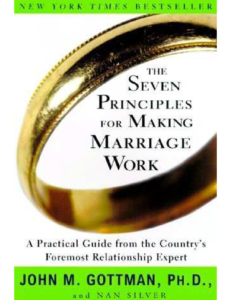 Dubbed “The Four Horsemen of the Apocalypse” by relationship expert John Gottman, Ph.D., these four communication habits can reliably predict the end of a relationship. Note that while Gottman’s research focuses on marriage, I believe this information is equally applicable to parent-child, workplace, social and other types of relationships. An awareness of these damaging habits is part of what is commonly known as “emotional intelligence.”
Dubbed “The Four Horsemen of the Apocalypse” by relationship expert John Gottman, Ph.D., these four communication habits can reliably predict the end of a relationship. Note that while Gottman’s research focuses on marriage, I believe this information is equally applicable to parent-child, workplace, social and other types of relationships. An awareness of these damaging habits is part of what is commonly known as “emotional intelligence.”
- Criticism – This is different from voicing a complaint, in which you identify specific problematic behaviors. Criticism is more global, and is against the person rather than the problem behavior. A complaint focuses on what the other person has done, rather than on who you perceive the other person to be. As you will see below, criticism often includes unhelpful thinking habits, such as overgeneralizations and labeling. For example:
- Complaint: “I was annoyed when you brought friends home without calling first. I thought we agreed that we would do that for each other.”
- Criticism: “You never think about how your behavior is affecting other people. No way you forgot! You’re just selfish. You never think of others! You never think of me!”
- Complaints can facilitate problem-solving, while criticism tends to shut down communication and negotiation. Criticism is not a fatal error, but if it becomes a habit, it can lead the way to the other deadlier problems to follow.
- Disrespect – Contempt goes far beyond criticism, which attacks the other’s character;. It is the single strongest predictor of relationship destruction. We treat the other person with contempt, mock them with sarcasm, ridicule, call names, mimic, scoff, roll our eyes, etc. The target is likely to feel worthless and rejected. With disrespect, we assert our belief in our own moral superiority over the other!
- “You’re ‘tired?’ Boo-hoo!. I’ve been with your kids all day, running around like mad to keep this house going and all you do when you come home is flop down on the sofa like a child and play those idiotic video games. I don’t have time to deal with another kid. Could you be any more pathetic?”
- Disrespect is typically fueled by long-simmering negative thoughts about the other, which come to a head when the perpetrator attacks the accused from a position of relative superiority.
- Defensiveness – Criticism and disrespect often trigger defensiveness in the other person. It is natural to want to defend one’s self from attack, but it is almost never successful. Our excuses just tell the attacker that we won’t take responsibility for our mistakes. For example:
- Question: “Did you remember to book the hall like you promised?”
- Defensive response: “I was just too busy today. You know how busy my schedule is. Why didn’t you just do it yourself?”
- This person not only responds defensively, but also tries to reverse blame to make it the other person’s fault. Instead, a non-defensive response can express acceptance of responsibility, admission of fault, and understanding of the other’s perspective:
- “Oops, I forgot. I should have asked you this morning to do it because I knew my day would be packed. That’s my fault. I’ll call them right now.”
- It is perfectly understandable to defend yourself if you’re stressed out and feeling attacked, but this approach rarely has the desired effect. Defensiveness only escalates the conflict if the critical person does not back down or apologize. This is because defensiveness is really a way of blaming the other; it won’t allow for healthy conflict management.
- Stonewalling — The listener withdraws from the interaction, shuts down, and stops responding to the other. Rather than confronting the issues, people who stonewall can make evasive maneuvers such as tuning out, turning away, acting busy, or engaging in obsessive or distracting behaviors.
- It takes time for the negativity created by the first three problems to become overwhelming enough that stonewalling becomes an understandable “out,” but when it does, it frequently becomes a bad habit. And unfortunately, stonewalling isn’t easy to stop. It is a result of feeling “flooded.” When we stonewall, we may be in a physiological state where we cannot discuss things rationally.
- If you feel like you’re stonewalling during a conflict, stop the discussion and ask for a break:
- “I’m feeling too angry to keep talking about this. Can we please take a break and come back to it in a bit? It’ll be easier to work through this after I’ve calmed down.”
- Then take 20 minutes to do something alone that soothes you—read a book or magazine, take a walk, go for a run, really, just do anything that helps to stop feeling flooded—and then return to the conversation once you feel ready.
Defenses Against these Four Bad Habits
Being able to identify these four bad habits in your conflict discussions is a necessary first step to eliminating them, but this knowledge is not enough. To drive away destructive communication and conflict patterns, you must replace them with healthy, productive ones.
Fortunately, each of these problems has a proven positive behavior that will counteract negativity. I will discuss these in a future article.
Unhelpful Thinking Habits Mentioned Above
Overgeneralization – Drawing conclusions from insufficient evidence. e.g., “This always happens” or “You never listen” or “I’ll never get better.”
Should Statements – Unhelpful rules about how every person should behave. “I should exercise more” or “My child must do as I say.”
Labeling – Generalizing one or two qualities into a negative global judgment. Instead of saying “I made a mistake,” saying” I’m a loser.”
All or nothing (polarized) thinking – Viewing things in absolute, either/or terms. Failing to recognize context, nuance or complexity.
References:
 The Seven Principles for Making Marriage Work: A Practical Guide from the Country’s Foremost Relationship Expert (John Gottman, Ph.D. and Nan Silver, 2015)
The Seven Principles for Making Marriage Work: A Practical Guide from the Country’s Foremost Relationship Expert (John Gottman, Ph.D. and Nan Silver, 2015)
A Guide to Rational Living (Albert Ellis, Ph.D. and Robert Harper, Ph.D. 1975)